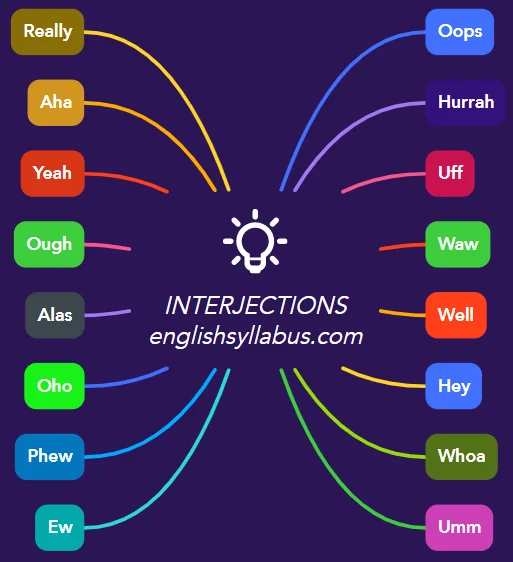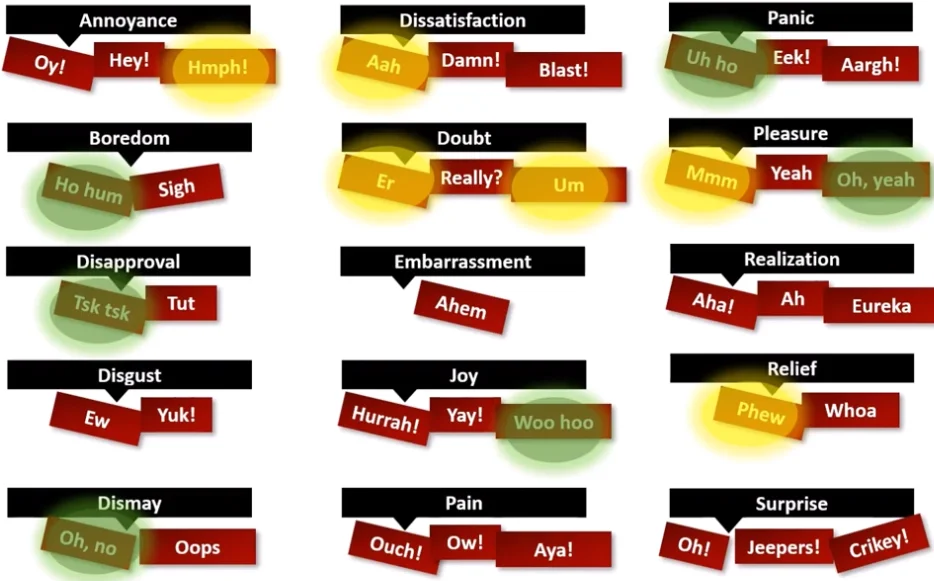Interjections are one of the nine parts of speech. Here they are in alphabetical order.
Definition for Interjections
Interjections are words that are added to a sentence to convey a sudden emotion such as surprise, disgust, joy, excitement, or enthusiasm. They usually appear at the start of a sentence and take a mark of exclamation mark ❗ with them.
Common Interjections are these:

- Aha!
- Ouch!
- Wow!
- Oh!
- Hurrah!
- Alas!
- Yes!
- No!
- Well!
- Oops!
- Hey!
Examples
- 1. Aha! we finished our task on time.
- 2. Ouch! You hit me hard in the arm!
- 3. Wow! You are really a jack of all traders.
- 4. Oh, I’m not wee sure about it.
- 5. No, you should not complain about her.
- 6. Alas! we missed the flight yesterday.
- 7. Oops, she forgot to inform me when to come.
- 8. Hey, would you help me out?
- 9. Ahem, you are quite hesitant to talk with me.
- 10. Yow! Nobody can believe you just broke the table!
- 11. No, I can’t go with you right now.
- 12. Great! You stood first in your class.
Examples of surprise
- Gosh! That was an unexpected bonus. =‘Gosh’ is the interjection.
- Jeepers! Did he win? =‘Jeepers’ is the interjection.
Examples of Disgust
- Ew! That’s disgusting! ‘Ew’ is the interjection.
- Yuck! Keep away from me! ‘Yuck’ is the interjection.
Examples of Joy
- Hoorah! the rain has stopped.
- Yes! We’re going home soon!
So, ‘hoorah’ and ‘yes’ are the interjections conveying joy.
Now, we’re not going to go through all of those a whole bunch of under 15 specific emotions. Notice that lots of interjections are sounds and some are two words.
We have yes, no, indeed, and well. And these are four very common ones, but they don’t fit easily under one of the emotions.

These four are used in many of those categories, so they might be more versatile, and they are common. But they do share one property with all interjections, and that is an interjection is not grammatically related to any other part of the sentence.
Use of Punctuation
You might have noticed that the punctuation after the interjections was different.
Sometimes, it can be a comma, a period, or an exclamation mark.
Commas and periods are used for mild interjections.
For example:
- No, that’s not true! Or
- No. That’s not true.
Notice there’s a slight pause thereafter the second one, and that’s when you might opt for a period over a comma.
But look at this, with an exclamation mark, these are used for strong interjections.
No! That’s not true!
Usually, the sentence after an interjection is with an exclamation mark. In other words, it’s an exclamatory sentence.
The last thing I want to say about punctuation is you might have noticed that all the interjections we’ve seen so far have been at the start of sentences. Well, that’s not always the case. Sometimes they’re in the middle. For example:
That is, well, not true.
And when an interjection is in the middle you can only use commas.
